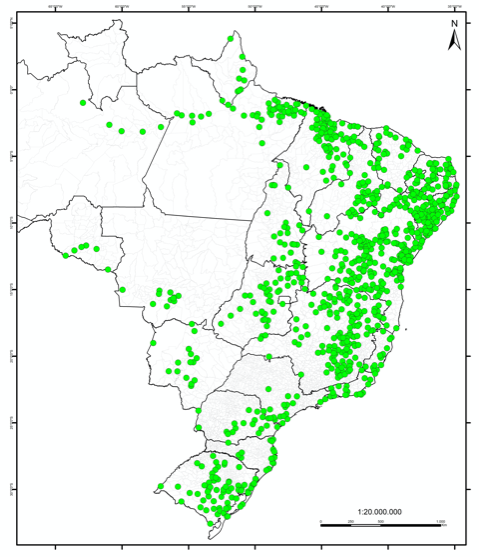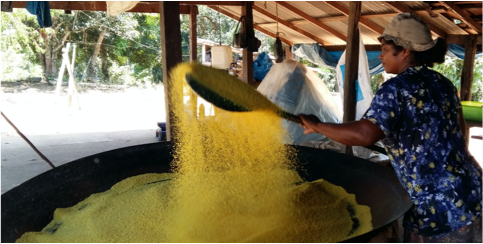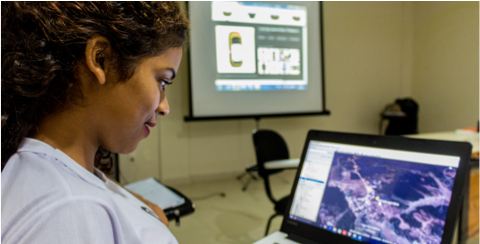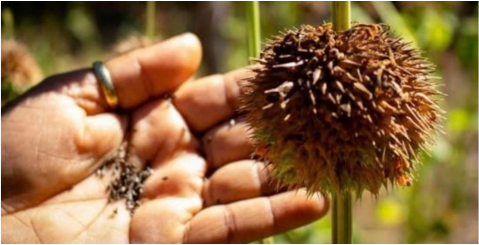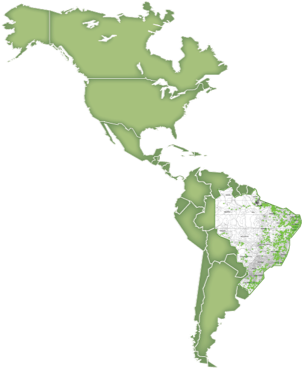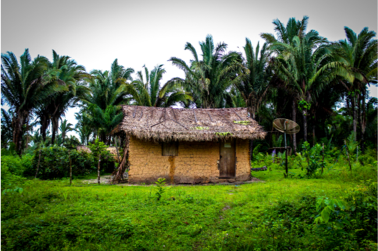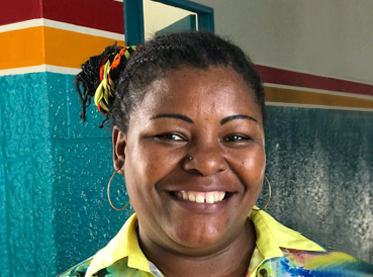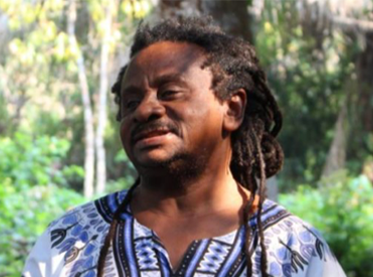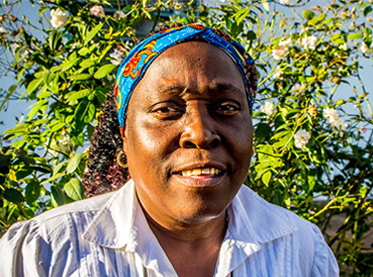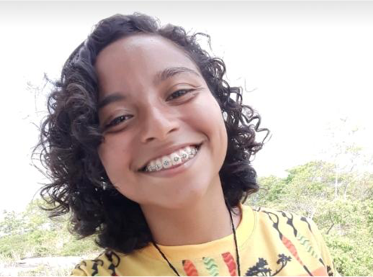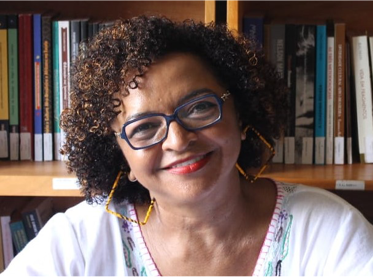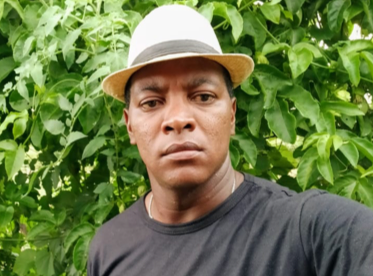THE HUMAN AMAZON
The Quilombola: At the nexus of the relationship between humanity and the environment
The Amazon rainforest, often referred to as home to the lungs of the earth, is known for its biodiversity. Less is known about the community of people who live there. Most of the rainforest covers northwestern Brazil, that is also home to indigenous people and descendants of Africans.
The Brazilian Amazon is home to almost 30 million people who depend on the region. Nearly 1 million are the Quilombola
– proud descendants of enslaved Africans who wrested their freedom from their captors and formed their own independent settlements in the forests and savannas of the Brazilian interior. The dense forests filled with rushing waters and thick brush provide a natural bounty of sustenance, while a bounty placed on that land now threatens the lives of the people who had found safeguard in its terrain.
In recent years, deforestation, roads, mining and other infrastructure and extractive projects in Brazil are killing the Amazon and other ecosystems and threatening the survival of the planet and the humans who have fought for, cared for, and earned first rights to the land.
For centuries, the Quilombola have been preserving their culture and fighting for their land and their rights. The pride of Quilombo remains a way of life, culture, religious belief, and relationship with the environment and a social construct that opposes a racist and oppressive model that imposes itself to the present day. Their unique relationship with their territory and historic path of resistance are key components of their identity and fundamental to their existence. It is the very foundation of their physical, social, economic, cultural, political and organizational reproduction.
From resistance to resilience to a regenerative economy, the Quilombola are conserving history, culture and our planet’s eco-system.
Quilombola are key allies in saving the Amazon and other critical ecosystems. For centuries, they have been the caretakers of the environment with regenerative organic agriculture as a sacred and responsible relationship with nature and her garden of paradise. Their carbon-free care of the trees, the soil, the vegetation contribute to the healthy and holistic oxygenation of the planet and the air we all breathe.
Quilombos have always worked in harmony with nature and each other, holding a knowledge of sustainable science that has been passed down from generation to generation. Organic production that has sustained their families for centuries is used for everything: from their food, to their festivals, to their healing and ancestral rituals. They are also using their sustainable science to produce sustainably-grown food for ‘food deserts” in Brazilian urban centers, an increasingly important solution for agrarian reform and the elimination of food insecurity prevalent throughout the world. Their fight for their rights to protect and conserve their land and their environment is a global issue.
Quilombola are also conservators of Afro-Brazilian culture, known and celebrated around the world. If you have ever danced a samba or been captivated by the nimble moves of breakdancers on an urban street corner, you have had a lived experience in Afro-Brazilian culture. Richly endowed with creativity, ingenuity and the spirit of ubuntu, Quilombola are one of the most overlooked and under invested Black communities in the world.
The Spirit of Ubuntu
As much as theirs is a history of resistance, the Quilombola are writing a new story of resilience and restoration. Within a truly egalitarian society, communities are strengthened with shared values, shared ownership, and shared responsibility, resources, and technology – poised to turn peril into promise.
Ubuntu
“I am because we are”
Organized in a network of collectives led by decision-making bodies, many of them led by women, the Quilombola are armed with global environmental and economic impact solutions and a strategy for their own future of prosperity that also will have significant impact on ours.
A Rich Legacy and a Promising Future
Quilombola historical figures and their storied conquests are the stuff of screenplays. Zumbi of Palmares; Aqualtune, an African princess, daughter of the King of Congo; and Dandara, a great warrior from Quilombo dos Palmares conjure images of the heroes of “Wakanda”, the mythical land in Marvel Studio’s “Black Panther” blockbuster hit. However, these very real people are the very essence of who the Quilombola are today. Every year, in November, the Quilombola celebrate Black Awareness Day to teach, learn, live and love a proud history, to take full measure of current blessings, and to look forward to purpose and prosperity for all Quilombos and Quilombola. Here are stories of the people, the events, and the promise:
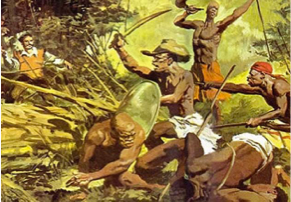
Zumbi of Palmares – Zumbi (1655 – November 20, 1695), also known as Zumbi dos Palmares was a Brazilian of Kongo/Angola origin and a quilombola leader. He is one of the pioneers of resistance to slavery of Africans in Brazil. He was also the last of the kings of the Quilombo dos Palmares, a settlement of Afro-Brazilian people who had liberated themselves from enslavement in that same settlement, in the present-day state of Alagoas, Brazil. Read more
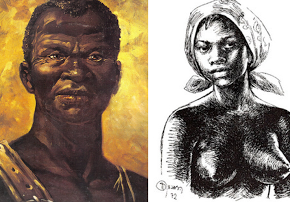
Black Awareness Day – November 20 is known as Dia da Consciência Negra (Day of Black Consciousness or Black Awareness Day) in Brazil. On this day, Brazilians recognize the efforts towards equality of the Movimento Negro (Black Movement) and celebrate black resistance and liberation by honoring Zumbi dos Palmares, a national hero. Read more
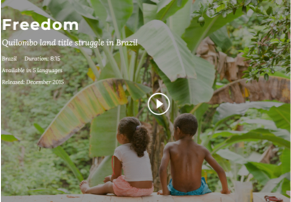
If not us, then who – Brazil’s African slave descendants, the Quilombola, have fought a long and hard struggle for recognition. After the abolition of the slave trade they were left abandoned and ostracised, devoid of rights and outside of Brazilian mainstream society. But things are slowly changing amongst rural communities. Read more
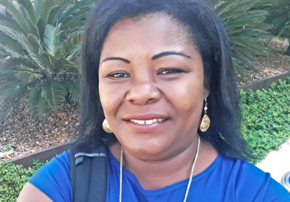
In pursuit of land titles, the work of ARQMO (Association of Remaining Quilombo Communities of the Municipality of Oriximiná) – Interview with Claudinete Colé, ARQMO’s First Woman Executive Coordinator. #

An important global solution for the Quilombola is the UTU Social Impact Investment Fund. The first priority of a multi-tiered strategy for a secure future of independence and economic development is to use that investment for the return of their land rights and sovereignty to pursue peace, purpose and prosperity for Quilombola communities across the nation. With secured land and civil rights to gain access to public resources, the Quilombola will be able to resume sustainable growth and protect the future of their agriculture, culture and participation in global economic development.
Global Connection
“If the people are well, then the environment follows.”
– Vasco van Roosmalen, Ecam
ECAM
THE Brazilian Team for Conservation of the Amazon
GOOGLE EARTH
“We are inspired by the work being done by the Quilombola in using technology to map their lands”
– Google Earth Outreach
USAID/Brazil supports CONAQ international land titling workshop with Afro-Colombian communities’ delegation
USAID | BRAZIL
WILSON CENTER
“A unique relationship with their territory and their historic path of resistance are key parts of their identity.”
– As recognized by the Brazil Institute and presented by The Wilson Center
The State Department 2018 Human Right briefings on Brazil
US STATE DEPARTMENT
“If the people are well, then the environment follows.”
– Vasco van Roosmalen, Ecam
ECAM
THE AMAZON CONSERVATION TEAM
“We are inspired by the work being done by the Quilombola in using technology to map their lands”
– Google Earth Outreach
GOOGLE EARTH
USAID/Brazil supports CONAQ international land titling workshop with Afro-Colombian communities’ delegation
USAID | BRAZIL
“A unique relationship with their territory and their historic path of resistance are key parts of their identity.”
– As recognized by the Brazil Institute and presented by The Wilson Center
WILSON CENTER
The State Department 2018 Human Right briefings on Brazil
– Read more
US STATE DEPARTMENT
We invite you inside our community
How can you help ?
The battle continues to be waged on several fronts as the Quilombola are facing the global pandemic of colonialism, erasure, systemic racism, and now COVID-19. Reuters. A COVID Relief Fund has been established to secure much needed support for vaccinations, health care, and emergency supplies. All donations will be routed through our US fiscal sponsor the Perspectives of Freedom Foundation and will be directed to CONAQ and its affiliate Quilombola organizations.
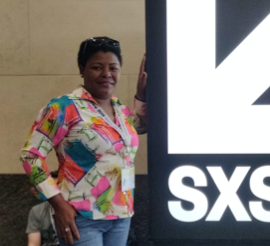
Nete was born in Boa Vista, a riverside community of 280 families living very close to Porto Trombetas, a town founded in the 1970s to house the workers of what was to become one of the largest bauxite mines in the world. Traditionally, those families relied on hunting, fishing, gathering and selling Brazil nuts for their subsistence. But they stopped planting manioc and making manioc flour because most of the people living in Boa Vista today work in the mines, or as cleaners and gardeners.
“We know that there are people abroad that have a special perspective, that have a special place in their hearts for Quilombola people. Some of our people will go and fight for a better quality of life, a college education, in order to be able to come back to help and contribute to their Quilombos. In my personal opinion, I believe that in institutions both in Brazil and abroad people want to work with Quilombola people, because they know this truth: this love that we have for the land, for the forest, for the Amazon. We preserve this place and in turn they understand this is our way of life, and the variety of things that we have to survive.”
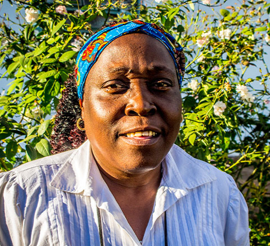
Sandra Maria da Silva is National and Executive Coordinator of CONAQ, founding partner of the N’GOLO -Federation of Quilombola Communities of Minas Gerais, Coordinator of the CONAQ Women’s Collective, and co-author of Quilombola Women – Territories of Black Existence.
Sandra is a Quilombola from the Carrapatos da Tabatinga Community of Bom Despacho in Minas Gerais. After earning a degree in Accounting and her Master in Traditional Knowledge at Federal University of Minas Gerais (UFMG) and a degree in Social Work at UNIPAC, her roots in the struggle to maintain the Quilombola cultural, ancestral and territorial legacy made her understand that she had a different mission. The influence of her mother, Sebastiana, and her religion led her to understand very early that Quilombolas are a people who struggle for a different meaning from that permeate the existence of most other people. This perception had an impact on the way in which her political trajectory took place, which originated from a deep desire to create means for the Quilombola collective existence to be maintained.
It was a natural process: one thing pulling the other, one struggle leading to the other, and this was how the entities she helped to concept and connect began to emerge into the Quilombola Project. CONAQ, the Federation, Women of the Country, AMNB, Coalition and other community coalitions represent society and the power of relationships that are key to not only the Quilombola struggle, but the struggle of black women for rights, recognition, respect and dignity and territoriality.
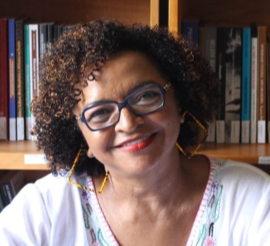
Givania Maria de Silva is a Quilombola of Conceição das Crioulas, in Salgueiro, Pernambuco, and a descendant of the women who arrived in the backlands of Pernambuco in the 18th century and marked the regional history of cotton production and spinning. She was the first in her community to attend college despite the difficulties of living in the countryside, with little money and facing racism.
Givânia earned a Master in Public Policy and Education Management in the University of Brasília, with a specialty in the area of race relations, and was the first director of Teacher José Mendes School, created in the Quilombo of Conceição das Crioulas.
One of the founders of CONAQ, and recognized by the Government of President Lula, she took over the Secretariat for Policies for Traditional Communities (Subcom), in the Secretariat for Policies for the Promotion of Racial Equality (Seppir), and coordinated the national policy for land tenure regularization in the Quilombola territories at INCRA (National Institute of Colonization and Agrarian Reform).
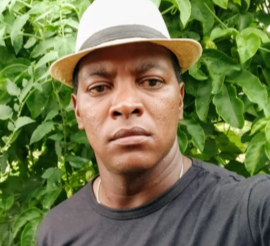
Jhonny Martins de Jesus was born in Campo Grande, capital of Mato Grosso do Sul. Quilombola from the quilombo Furnas dos Dionísio, where he studied while helping his parents and grandparents on the family farm.
Inspired by his own family roots, at the early age of 19, Jhonny began his career with the Quilombola movement working on the agenda of public policies in important roles as president of the Quilombola Association of Furnas dos Dionísio, founder and president of the State Coordination of Black Rural Quilombola Communities of Mato Grosso do Sul, and executive director at CONAQ. Being able to claim and implement the Brasil Quilombola Program, the Racial Equality Statute, and the acceptance of Quilombolas as subjects of law of Convention 169 of the International Labor Organization, helped to construct INCRA (National Institute of Colonization and Agrarian Reform) that regulates the regularization procedures for Quilombola lands. His work led to the recognition by the Brazilian State of the rights that are guaranteed in the Federal Constitution of Brazil, promulgated in 1988.
His work led to the recognition by the Brazilian State of the rights that are guaranteed in the Federal Constitution of Brazil, promulgated in 1988.
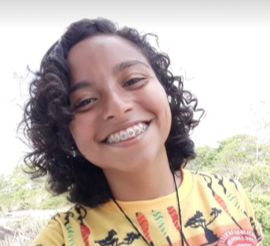
Debora Gomes Lima is a Quilombola from Quilombo Pé do Morro, located in Aragominas, Tocantins. She is a graduate student in Chemistry, a lesbian, activist in the LGBTQI + cause, and in all movements that contemplate her intersectionality.
“Despite having existed for so long, the Quilombos do not have the necessary visibility. Quilombola history is great and goes beyond slavery. The roots are sacred heritage that must be recognized. CONAQ has the main role in the fight for the territory of law, in the spaces dedicated to the Quilombola people, inside the universities with the guarantee of permanence through scholarships. The movement has grown significantly and has rescued Quilombos that have long been forgotten. There is constant work done by the organization of Quilombola guidelines and claiming their rights.”
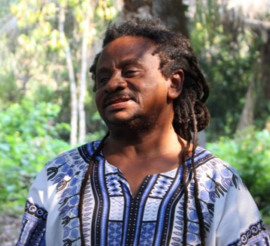
Ivo Fonseca da Silva was born in Quilombo Frechal, in Mirinzal, Maranhão. His leadership began in 1973 in the successful fight for the rights of his own Quilombo. In 1992, the Frechal Quilombo was recognized as an Extractive Reserve and became the first Quilombo territory in Brazil to be certified as by the Cultural Palmares Foundation. Today, it is a symbolic location for the memory of fighting slavery and fighting racism.
Continuing his proud legacy, Ivo continues to be dedicated to the human rights of Quilombola communities throughout the country. He has been giving and living his best life in service as a coordinator, member, or manager in more than a dozen organizations:
- National Coordination of CONAQ
- Municipal Executive of the PT of Mirinzal
- Association of Black Rural Quilombola Communities of Maranhão (ACONERUQ)
- Black Rural Quilombola Communities (CONAQ)
- Association of Residents of the Quilombo Frechal Extractive Reserve (AMOREQUIF)
- Center for Black Culture of Maranhão (CCN-MA)
- Extraordinary State Secretariat for Racial Equality (SEIR)
- State Directory of the Workers’ Party (PT) of Maranhão
- Promotion of Racial Equality (CPIR), Cultural Palmares Foundation
- National Council for Human Rights (CNDH)
- State Council for the Racial Ethnic Equality Policy (CEIRMA)
- Maranhense Human Rights Society (SMDH)
- and, as a UN volunteer in the United Nations Development Program in 2005-2006.
Your support will make an impact in our programs to protect the Quilombola people from the ravages of COVID 19
CONAQ estimates that Brazil has a population of over 16 million Quilombolas, many of whom are still completely invisible.
